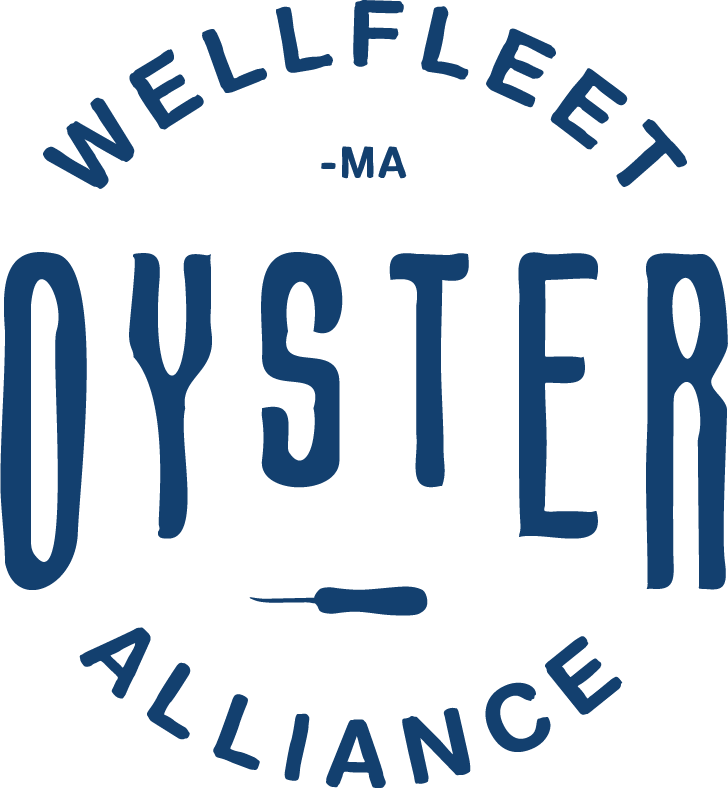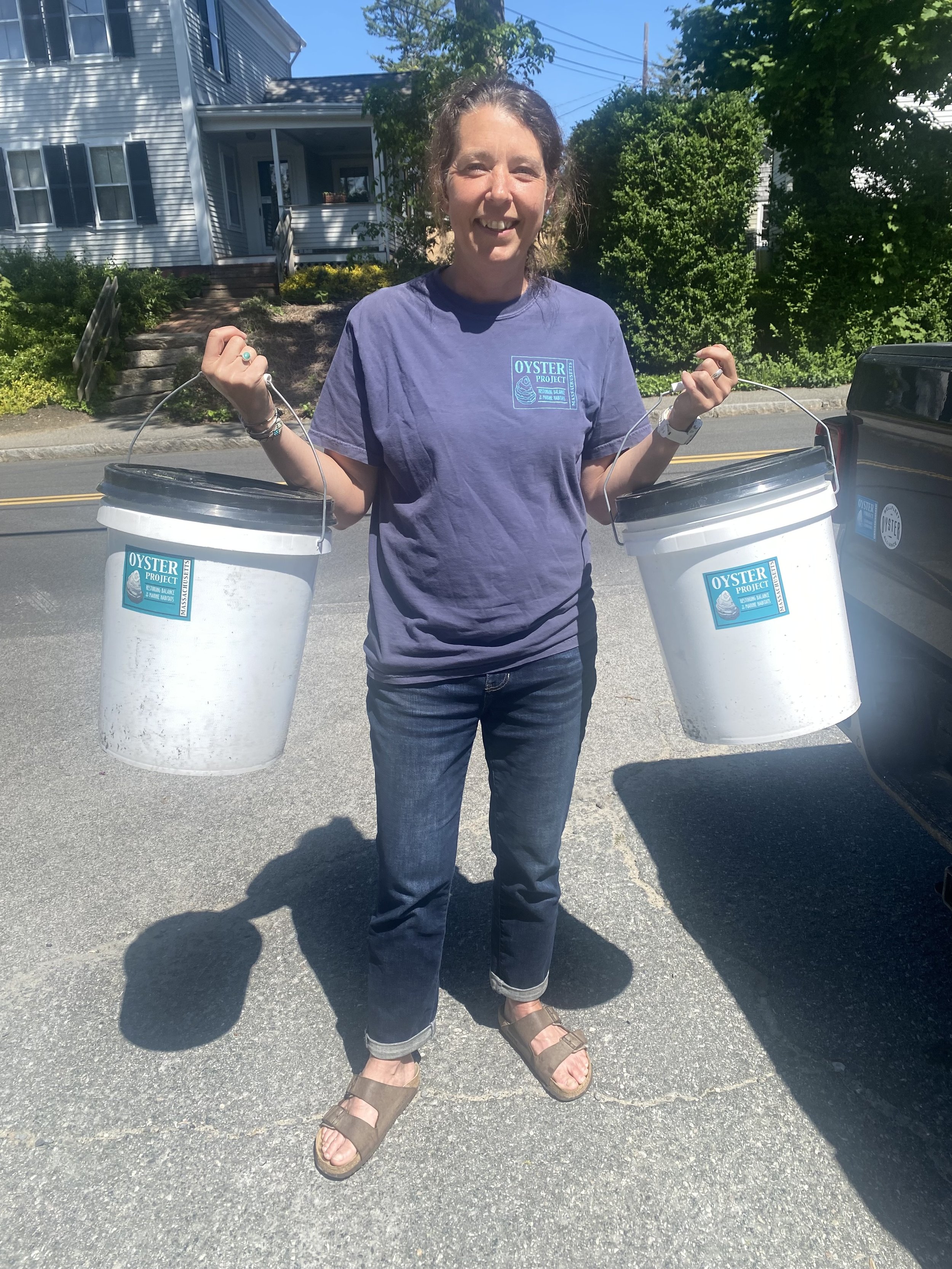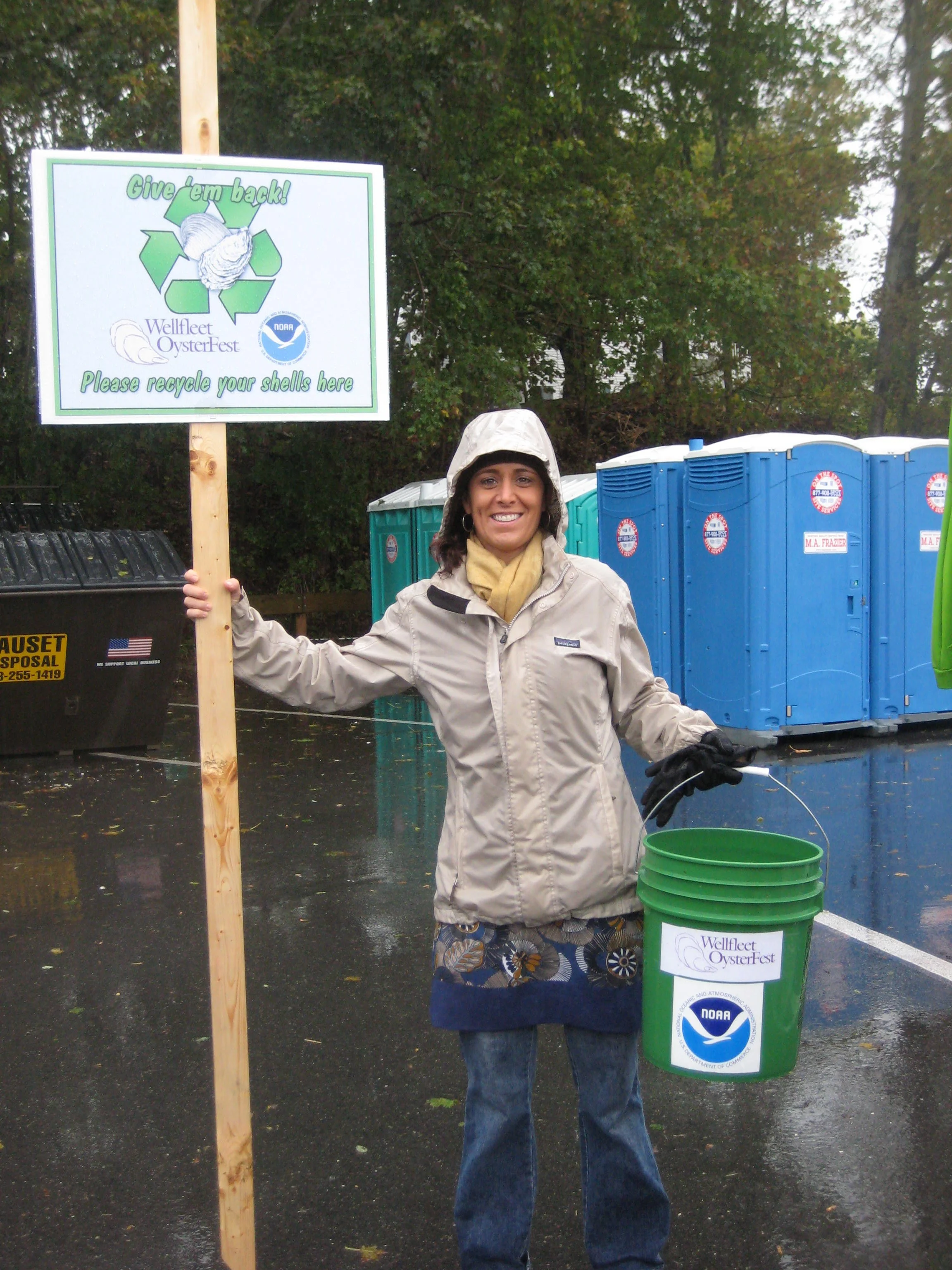Leading The Recycling Charge
Erika Smith of the Mass Oyster Project with recycling pails with shells collected from local restaurants.
Two Women and the Wellfleet OysterFest Are Raising the Value of Oyster and Clam Shells
Many recognize the Wellfleet OysterFest for having the largest oyster shucking competition in the world. Another badge of distinction is that OysterFest is likely the single biggest shell recycling event on the planet.
Oyster shells have always played larger roles than simply housing the tasty animals that create them. In ancient Mexico, thousands of tons of whole live oysters were harvested, crushed, and used to build enormous temples along the Pacific Coast. At the height of oyster harvesting in the mid-to-late 1800s through the early 1900s, enormous mounds of oyster shells around oyster canneries in New York, Boston and even in Wellfleet, were crushed and used to make cement for America’s rapidly growing cities and towns.
When the oyster-eating boom diminished a century ago, shells of oysters and other shellfish were virtually worthless and typically ended up in landfills and driveways. Today, however, the shell recycling movement is in full swing, with oyster shells as valuable as they have ever been – not for furthering construction of buildings and temples, but for rebuilding oyster reefs and restoring shellfish populations that for many decades have been in sharp decline. If there is a single event leading today’s shellfish recycling renaissance it is Wellfleet OysterFest, which over the last two decades has recycled nearly 100,000 pounds of shells for use in the restoration of both oyster habitat and populations. Leading this burgeoning movement are two remarkable and dedicated women, who view Wellfleet as a unique community, the ideal prototype for other towns wishing to transform landfill refuse into water-purifying, habitat-enhancing shellfish reefs and farms.
Wellfleet Oyster Alliance (WOA) board member Carli Bertrand has been a volunteer at every OysterFest since its humble start on Mayo Beach in 1999. While she credits Kathy Stetson, one of the Fest’s original organizers, with introducing its shell recycling program, Bertrand has been the Fest recycling’s greatest champion over the last two decades. A Wellfleet native and the veteran outreach coordinator at the National Marine Fisheries Service (NMFS) Center for Habitat Restoration, she brings both passion and professional acumen to the task of restoring the marine environment. “The Wellfleet OysterFest has been a powerhouse event for brokering shell recycling into positive environmental impacts,” she says. Remembering the Fest’s early days and its subsequent impact on the recycling movement, she said, “We were doing recycling before anyone else was even thinking about it, before there was even a commercial value for shell.”
WOA board member Carli Bertrand of NOAA has led Wellfleet OysterFest’s shell recycling for nearly two decades.
When the Fest recycling program began, Bertrand immediately stepped in and helped create a strong relationship between the event and the National Oceanic and Atmospheric Administration (NOAA), NMFS’s parent entity. “I knew right away NOAA could help us.” Through her professional coordinating efforts she was able to parlay her experience establishing and promoting OysterFest recycling into a region-wide awareness for the importance of shell recycling.
Nowhere is recycling growing faster than in Massachussetts. And nobody is working harder in the State’s recycling resurgence than Erika Smith of the Mass Oyster Project. Using Wellfleet OysterFest’s recycling success as an example, and backed by a recent $10,000 WOA grant, Smith and her team have established a groundbreaking effort to collect and recycle additional tons of shells from area restaurants and bars. Now in its third full summer, the project enjoys virtually 100% participation from Wellfleet eateries and watering holes. During the summer months, Mass Oyster Project employees and volunteers regularly collect five-gallon pails with screw tops filled with shells, which are deposited in a dedicated recycling area in the town transfer station. Once “seasoned” for a year to protect the harbor from any oyster disease, these shells are deployed by the Wellfleet Shelllfish Department as culch to collect seed oysters for enhancing the town’s beds.
The Mass Oyster Project is also developing new recycling programs in other Cape Cod towns, including Hyannis, Nantucket and Barnstable. Smith is also working with local organizations to create public recycling sites. Smith, who left a long career in supply chain support, is familiar with the challenges of moving products around. It’s one thing to do the actual collections, she said, but having a place to deposit the shells, especially “unseasoned” shells, adds a layer of complication.
But if any community can rise to the challenge, it’s Wellfleet, “This town is unique,” she said, referring to its large industry, active town shellfish department, and its world-famous OysterFest. “Wellfleet can encompass everything we want to do.”
How You Can Help
Join OysterFest’s corps of volunteers to help facilitate its shell recycling efforts
Visit Polestar Boston’s booth at OysterFest to tell them how much you appreciate their role as Major Sponsor of the Fest’s recycling efforts and their support of the Mass Oyster Project
Tell participating restaurants how much you appreciate their association with OysterFest and the Mass Oyster Project
Visit massoyster.org to learn more about the Mass Oyster Project


